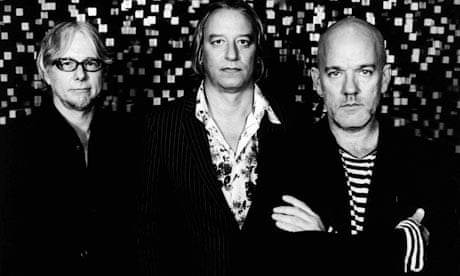Outside the swish Connaught Hotel, London is bathed in sunshine, but very little of it finds its way into the conference room where Michael Stipe is thoroughly examining the small box of mints that sits beside every place setting. The main reason for his visit, he points out, is the Frieze art fair in Regents Park, which starts today. But, of course, REM's profile – by virtue of their imminent dissolution – has rarely been higher. In a neat little pile on the table are promo copies of the group's farewell release, and Stipe runs his fingers across the sleeve of the compilation Part Lies, Part Heart, Part Truth, Part Garbage 1982-2011, and ponders that the texture doesn't quite meet his specifications.
We could have met in a cafe or a pub, perhaps even ventured out to Regents Park. But a conference room is an entirely apt setting for an encounter that, at least to begin with, feels more business than pleasure. You can't blame Stipe for being suspicious of his interrogators. Five years ago, an encounter with the Times virtually stalled when the singer took exception to what he saw as the British press's serial attempts to out him from a closet he had no interest in occupying. Elsewhere, he has been known to issue a curt "fuck off" when greeted with a question he doesn't like. At times, it's been hard not to sympathise. How would you like it if you turned up to be interviewed on The Culture Show, as Stipe did in 2004, only to be told by Paul Morley that you had become an "oldies band"? The last time we met, two years previously, Stipe seemed reconciled to what he thought posterity would have to say about him. "That's what will be in my obituary," he said. "That I was a singer for a band called REM in the late 20th century … Of course, it's not all I want, but it's there."
Later, speaking from the home he keeps in Seattle (he also shares a house with his girlfriend in Portland), guitarist Peter Buck will tell me that it would have been around then that the group first discussed the idea of going their separate ways. One of the founding members, though, didn't hear until a few hours before they went public with the news in September. That's when it occurred to bassist Mike Mills that he should perhaps tip the wink to drummer Bill Berry, who left the band in 1997. "I left a message on his voicemail," Mills says. "I assume he got it, but I never heard back."
Back in the conference room, Stipe's piercing blue eyes deaden when he's asked who first broached the idea of a split. "That's not important, I don't think."
In the general scheme of things, of course, he's right. It's not important. But still, I don't see why it's a thorny issue.
"It's nobody's business," he says flatly.
This doesn't feel like a particularly transgressive question, I say.
A hint of weariness enters Stipe's tone. "We don't have to bat a difficult interview back and forth all day, do we?"
So we move on. Thirty years is a long time to be making records for a band who, in Buck's words, imagined that – with hard work and the right breaks – "could be as well-known as Big Star". In fact, the albums Out of Time and Automatic for the People made them rock stars and, by 1995, they were playing stadiums to promote their album Monster (they hadn't toured the previous two albums). "That was the first tour where we weren't just playing to our peer group," Buck recalls. "Once we had a hit single, things changed a little bit. We were, like: 'Wow, there's so many young people out there. Like, teenage girls. One show, while Michael was talking [to the audience], Mike says to me: 'Look how many people there are. I think at least one person in this place has murdered somebody.' And, well, yeah – if you've got 56,000 people in a place, I guess there is a murderer out there. I would like to think that we don't draw an extra number of them, but you never know."
Success on that scale impacted upon the different members of REM in different ways. "It helped drive Bill away from it all," Buck reckons. I suggest that being in REM after Losing My Religion sent them supernova must have at times felt like being in an iron lung. The thing that collectively keeps you alive is also the thing beyond which you can never quite venture. "OK. That's a fair enough analogy," Stipe says, before abruptly appearing to be put out. "Well, I could apply that to public transportation if you want to take it further. It gets you where you want to go [even though] it might not be the happiest ride. Or sweaters. They keep you from catching colds. Come on, really, that's a little harsh." Finally, witheringly: "I wouldn't compare my 31-year career with my best friends to dialysis."
Buck's response is strikingly different. "It is true. I'm a particularly driven, ambitious person," he says. "Not for financial success. But every record we've ever made, the day we finish it, I start panicking about having a new stock of songs that are great for our next record." Stipe recalls how, as just one of many post-punk bands emerging from the campuses of Athens, Georgia, Buck's manic motivational energy set REM apart. "It was Pete who used his encyclopaedic knowledge of rock history to pre-empt all the stupid ways that groups fall apart. There were very simple rules: you share all your publishing and you don't fight about petty things and it's democratic. Everybody gets a veto vote, not just the singer."
Had Buck imagined that REM might still exist in the 21st century, he might have come up with a rule about working methods. "The three of us have … not different goals [but] different ways of approaching what we want to do," he explains. "And mine is radically different from the other guys. I've found as I get older that I like to work quickly and spontaneously. I don't like doing the same thing over and over again."
Buck has, by his own admission, been "trying to keep it fresh" ever since the group's network TV debut (on Letterman) when the group elected to play an unnamed three-day-old song that would turn out to be the imperishably wonderful So. Central Rain. After the drawn-out sessions for 2004's disastrous Around the Sun, he got his own way for 2008's rawer Accelerate and the "raucous, out-of-control" tour that followed.
"For me," he says, "not knowing exactly what's gonna happen is important. We played a total of 93 different songs on those shows, songs that we didn't even know how to play. The feeling was: 'Can we ever better this?' And I thought: 'Maybe not. Maybe this is the last tour. Right into making [this year's album] Collapse Into Now, we had a little talk about what we wanted to accomplish and decided that we wanted to make one final last great record."
Did REM, as many said on their demise, overstay their welcome? Certainly, by opening their account with a run of near-perfect albums (Murmur, Reckoning, Fables of the Reconstruction), they set a standard that wasn't always possible to maintain. Allow the needle to drop on almost any early REM song – from the Paisley-patterned folk-rock of Seven Chinese Brothers to the lysergic southern gothic portent of Feeling Gravity's Pull – and the alchemy is little short of overwhelming. But perhaps mainaining that sort of quality control wasn't the real problem, so much as the proclamation that seemed to come as standard with each album from 1998's Up – that this was the real return to form (true in the case of Up, but less so thereafter). It's hard to get the measure of a new record when you are suspicious of the buzz around it.
Certainly, in light of the split, there's something unexpectedly moving about watching footage of the group playing the Collapse Into Now songs in the large room of Berlin's Hansa Studios, where the album was recorded. Discoverer and Stipe's tender post-Hurricane Katrina paean Oh My Heart sound fantastic. "There's a good chance that we'll never play together again," Buck says. "And that'll make me feel sad, except for the fact that I played [those songs] a lot for a long time. I can't imagine anything in this moment that would cause us to use the name REM and play songs again." Speaking from his Athens home, bassist Mike Mills remembers that final performance: "It was a very fraught day and very emotional. But we weren't going around saying: 'This us the last one! Wow! This is weird!' I think everyone was aware of it in their own way though."
Perhaps it's surprising they stayed together as long as they did. At the start of our conversation, Stipe referred to the rest of the band as his "best friends". Half an hour later, he seems to be urging me not to draw any conclusions about their friendship on the basis of them having been together for so long. "Proximity does not indicate intimacy," he says. "Shared history does not indicate a feeling of love or family or anything. I have a shared history with some of my neighbours whose last names I don't know and I couldn't tell you whether they go for roast beef or tofu."
Be that as it may, like all great bands when they start out, REM looked like a gang – albeit one that bore no sartorial relation to the presiding fashions of the day. Throughout the early years, the chronically shy, curly-haired Stipe and Buck, the garrulous sonic architect of the group, would share a room on tour. In 2011, Buck is fundamentally unchanged. And Stipe? It's hard to believe that nearly 30 years later, the same frontman – now a keen photographer – would be uploading pictures of himself naked in his New York apartment on to his Tumblr page. For all of that, he maintains the "eccentric in the band is not me. That should be obvious at this point."
If Stipe isn't REM's eccentric, the intended recipient of that accolade is unclear. Mills has long since snuck into the role of the band's affable pragmatist. Neither is eccentricity the first word that springs to mind over the course of an hour-long conversation with Buck. You don't get the impression that dealing with record companies is something he'll miss. "There are some things that never change," he explains. "Like with demos – a demo is supposed to show you what the arrangement of the song is and how it's gonna go. And you play it to someone from the record company and they go: 'The drums could sound bigger.' Well, it's a demo! My feeling has always been that nobody knows anything. If they did, all these bands they sign would have hits. Warner Brothers did not want Losing My Religion as a single. They were saying, 'No way! There's a mandolin on it!' And, of course, it was our biggest hit."
Back in London, Stipe steps into the sunshine and decides to walk to Regent's Park. Perhaps he's right. The world doesn't feel very much like an iron lung at the minute. Buck, too, seems anything but awed by the great post-REM beyond. He has recently returned from an extended stay in a small Mexican fishing village. "I kind of have a little bag," he explains, "I have a shirt and a pair of pants and a couple of books and I go somewhere. Other than that, my goal is to make music be my hobby."
As goodbyes go, it's hard to remember a more muted one than this. No final tour. No grand climax. But this is clearly just the way at least one member of REM wants it."We could be out there right now making a billion," Buck says. "But we'd be doing it for the money, and we've never done anything for the money. I hated rich people when I was young, and I still kind of do. Being one myself, it's a little contradictory, but hey, I can live with that."
Part Lies, Part Heart, Part Truth, Part Garbage 1982-2011 is released on Monday on Warner.




Comments (…)
Sign in or create your Guardian account to join the discussion